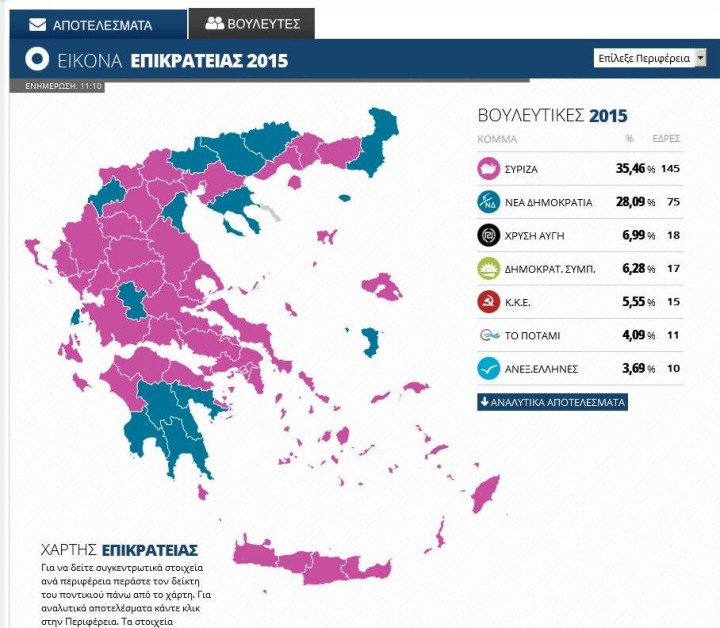The Greek people were asked yesterday to vote once more with the issue at stake being which political party or coalition can better implement the 3rd Memorandum. When we say better we mean the most painless possible way, if and where this can be done.
On Sunday the electorate considered that this task would be best carried out by Syriza and the mandate for Tsipras is clear, providing him with 145 MPs (corresponding to 35.47%). Being less than the 151 seats required to form a majority, a coalition agreement was therefore announced with the Independent Greeks (ANEL) (3.7% and 10 MPs) almost immediately after the first results came out. They even greeted together those who gathered in the centre of Athens to celebrate Syriza’s result. New Democracy and Pasok made their intention clear to not participate in the government. An old party called The Union of Centrists, surprisingly entered Parliament (3.4%) while Popular Unity, with the independent candidate and ex Chair of the Parliament, Zoi Konstantopoulou, unable to do likewise. Golden Dawn, the neo-Nazi party, gained 7%. Pasok got 6.2% and New Democracy held its share at 28%, just as the Communist Party did with 5.55%, while The River lost power (4%).
The leading player of these elections is Alexis Tsipras. The voters interpreted positively all the negotiations with the creditors between January and June, and gave an impressive NO to austerity in July’s referendum and they have now renewed their trust in him in these elections despite the 3rd Memorandum. The government is now asked to continue its work hoping that as most of its politicians haven’t been part of government Clientelism and the corruption of the past, maybe they will try to eradicate such behaviour. There is still a kind of hope that maybe this government will implement a fairer tax system and will be able to present to the creditors other measures that will bring the necessary funds and in this way assist the poorest parts of society. There are no big words said about development or about ways to reduce unemployment, this is a bet that remains unknown if it is going to be won.
But there is another leading player also. It is the 43.4% of voters who were disappointed by the behaviour of all parties that formed governments (including the Syriza-Anel government) especially after the referendum. Nobody can blame these people for being indifferent. Part of this percentage didn’t want new splits in the Left, nor did they want new Memorandums or new austerity measures. Part of it is ready to react to new unfair laws that pretend to resolve the banking crisis problem by putting the burden onto the weakest families of southern Europe.
Is it possible to rebuild the trust of such a large number of our people? The new government has to prove that this can be done and that representative democracy is not dead. By changing, as they keep saying, the dynamics within Europe. By not implementing reforms dictated by European Institutions if they are unfair. How possible is this within the framework of the 3rd Memorandum? Additionally Syriza must work on policies that promote human rights, for which a large part of its voters supported the party in January and also now. How can this be done within the framework of its co-governance with Anel?
One thing is certain: the new government of Tsipras needs the following 4 years to layout its plan and implement it. And at this very crucial moment for Greece and for Europe those of us who believe that he can succeed wish for this loudly and those of us who don’t believe in his success wish the same but in an even more intimate way.










